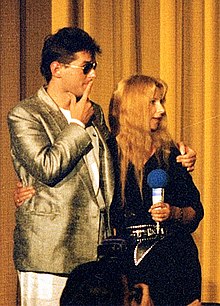Neue Deutsche Welle
This article includes a list of general references, but it lacks sufficient corresponding inline citations. (September 2010) |
| Neue Deutsche Welle | |
|---|---|
| Stylistic origins | New wave Pop music Schlager Punk rock Post-punk Krautrock |
| Cultural origins | Late 1970s Germany |
| Typical instruments | guitar, bass, synthesizer, drums, drum machine |
Neue Deutsche Welle (New German Wave, often abbreviated NDW) is a genre of German music originally derived from punk rock and New Wave music.[1] The term "Neue Deutsche Welle" was first coined by journalist Alfred Hilsberg, whose article about the movement titled "Neue Deutsche Welle — Aus grauer Städte Mauern" ("New German Wave — From Grey Cities' Walls") was published in the German magazine Sounds in 1979.
History

The history of the Neue Deutsche Welle consists of two major parts. From its beginnings to 1981, the Neue Deutsche Welle was mostly an underground movement with roots in British punk and New Wave music; it quickly developed into an original and distinct style, influenced in no small part by the different sound and rhythm of the German language which many of the bands had adapted from early on.
The main centers of the NDW movement during these years were Berlin, Düsseldorf, Hamburg, Hannover and Hagen as well as, to a lesser extent, the Frankfurt Rhein-Main Region, Limburg an der Lahn and Vienna (Austria).
From about 1980 on, the music industry began noticing the Neue Deutsche Welle; however, due to the idiosyncratic nature of the music, the focus shifted to creating new bands more compatible with the mainstream, rather than promoting existing bands. Many one-hit wonders and short-lived bands appeared and were forgotten again in rapid succession, and the overly broad application of the "NDW" label to these bands as well as to almost any German musicians not using English lyrics, even if their music was apparently not influenced at all by the 'original' NDW (including pure Rock bands like BAP or even Udo Lindenberg) quickly led to the decay of the entire genre when many of the original musicians turned their backs in frustration.
Around 1983/1984, the era of the Neue Deutsche Welle came to an early end, following the oversaturation of the market with what was perceived as stereotypical, manufactured hits. [citation needed]

A revival of interest in the style in the Anglophone world occurred in 2003, with the release of DJ Hell's compilation New Deutsch.[2] The NDW has come to be acknowledged as a forerunner to later developments in dance-punk, electronic body music, and electroclash.
In the 2000s, the term is being used by the Berlin-based rap label Aggro Berlin to describe a supposed new German rap movement that they claim to be a part of. This was the subject of Aggro-signed Fler in his 2005 single Neue Deutsche Welle.
Notable bands
Underground
- 1.Futurologischer Congress
- Abwärts
- Andreas Dorau
- Andy Giorbino
- Bärchen & die Milchbubis
- Daälbers
- Die Klopferbande
- Die Krupps
- Die Radierer
- Die Unbekannten
- Der Moderne Man
- Deutsch Amerikanische Freundschaft / DAF
- Einstürzende Neubauten
- Fehlfarben
- Foyer des arts
- Front
- FSK
- Geisterfahrer
- Grosse Freiheit
- Grauzone
- Hans-A-Plast
- Holger Hiller
- Ja Ja Ja
- KeinMenscH!
- KFC
- Kosmonautentraum
- Liaison Dangereuse
- Malaria!
- Male
- Mania D
- Mittagspause
- Mythen in Tüten
- Neonbabies
- Palais Schaumburg
- Der Plan
- Pyrolator
- Rotzkotz
- Saal 2
- Stahlnetz
- Stratis
- S.Y.P.H.
- Sprung Aus Den Wolken
- Die Tödliche Doris
- Tommi Stumpff
- The Wirtschaftswunder
- X-Mal Deutschland
- Die Zimmermänner
Note: Many of the underground groups were commercially successful; the dichotomy between underground and commercial NDW-groups has more to do with differences in sound, presentation and attitude.
Mainstream
- Alphaville
- Combo Colossale
- D.E.F.
- DÖF ("Deutsch-österreichisches Feingefühl": Joesi Prokopetz, Manfred Tauchen, Annette Humpe)
- Extrabreit
- Falco
- Felix De Luxe
- Fräulein Menke
- Gänsehaut
- Ideal
- Insisters
- Ixi
- Geier Sturzflug
- Hubert Kah
- Jawoll
- Joachim Witt
- KIZ
- Klaus Nomi
- Markus
- Nena
- Nichts
- Nina Hagen
- Paso Doble
- Peter Schilling
- Sandra
- Spider Murphy Gang
- Spliff
- Steinwolke
- Trio Trio preferred the label Neue Deutsche Fröhlichkeit ("New German Cheerfulness") to describe their music.
- UKW
- United Balls
